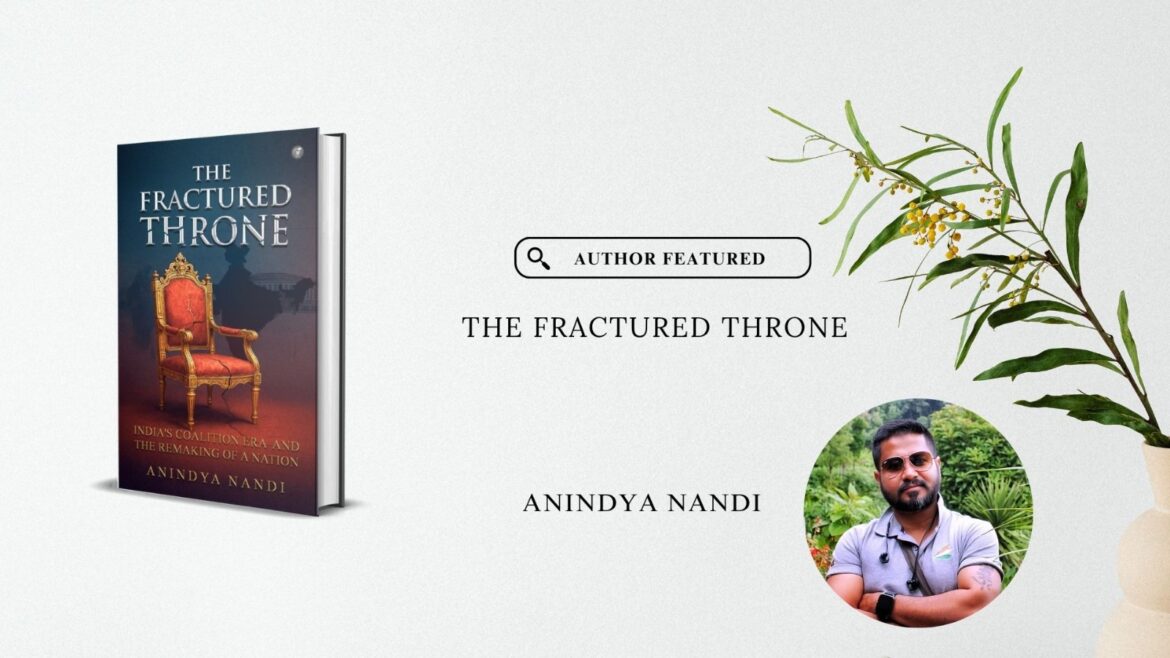Anindya Nandi’s journey from naval decks to the heart of India’s political transition is as compelling as the narrative he weaves in his latest book, The Fractured Throne: India’s Coalition Era and the Remaking of a Nation. A retired sailor of the Indian Navy turned author, political thinker, and cultural advocate, Nandi brings a rare blend of firsthand experience, historical curiosity, and analytical sharpness to his writing. His work is not just a chronicle of events—it is a reflection of lived history, informed by duty, discipline, and a deep reverence for the Indian civilizational ethos.
At the core of Anindya Nandi’s literary and intellectual pursuits lies an unwavering commitment to exploring India’s layered identity—politically, culturally, and philosophically. This commitment finds powerful expression in The Fractured Throne, a meticulously researched and deeply personal account of India’s transition from an era of Congress-led dominance to a turbulent but transformative coalition age. Anchored in the pivotal year of 1996, when Nandi was serving as a young naval recruit, the book unfolds like a voyage through political storm clouds. It mirrors the uncertainties of India’s leadership at the time, when the 13-day Vajpayee government collapsed, and the country stood at the crossroads of ideological and institutional change.
What sets this book apart is its unique narrative lens—Nandi does not merely present a historian’s analysis or a journalist’s report. Instead, he offers a citizen’s reflection, a sailor’s sense of national duty, and a storyteller’s gift for connecting the dots between parliamentary events and human experiences. Through the metaphor of navigating rough seas, the author effectively communicates the fragile and shifting terrain of Indian politics during the late 1980s to the early 2000s. The Congress party, once seen as the unshakable throne of Indian politics, is shown to unravel through a combination of corruption scandals like Bofors, economic mismanagement, and increasing regional assertions.
In capturing the essence of the coalition era, The Fractured Throne brings together voices from every corner of India—farmers from the hinterlands, students with big dreams, sailors with deep patriotism—all navigating the same questions about national identity and political purpose. Nandi examines how governance transformed when consensus became the currency of power, and single-party rule gave way to complex alliances like the National Front, the United Front, NDA, and UPA. He does not shy away from interrogating whether this shift weakened India’s democratic institutions or, paradoxically, made them more inclusive and resilient.
Beyond the political analysis, the book reflects Anindya Nandi’s broader worldview—one steeped in Sanatan values, historical consciousness, and strategic awareness. His background as a defence and geopolitical analyst is evident in the disciplined structure of his arguments and the clarity with which he assesses international influences on Indian politics. His leadership in the Rastriya Sanatan Sangathan—an apolitical body dedicated to preserving India’s cultural foundations—also informs his writing. Nandi sees political evolution not just as an institutional process but as a reflection of deeper societal currents. His scholarship is infused with a philosophical understanding of India’s role in the world, shaped by both ancient wisdom and modern pragmatism.
The Fractured Throne is not Nandi’s first foray into thought leadership. Through his monthly military magazine and various public engagements, he has built a reputation as a voice that bridges past and present, myth and policy, strategy and soul. His fascination with ancient Indian scriptures, his grasp of mythological symbolism, and his commitment to interpreting Indian history beyond colonial frameworks enrich his prose with a rare intellectual flavor. In this book, those strengths are fully visible—not just in what he writes, but in how he writes it. The language is evocative yet precise, the structure logical yet layered, and the insights both bold and grounded.
This work, while deeply political in theme, transcends the limits of partisanship. It is not a glorification of any single party or ideology. Instead, it is a call to reflection—a reminder that India’s democratic project is still unfolding, still vulnerable, but also filled with potential. Anindya Nandi challenges readers to look beyond electoral victories and legislative arithmetic. He urges them to see politics as a living organism, influenced as much by memory and myth as by media headlines and manifestos.
As a featured author, Anindya Nandi exemplifies the rare combination of service, scholarship, and storytelling. His voice is one of clarity in a time of noise, offering a measured but passionate examination of how a fractured political throne might still offer the space for a new kind of leadership to emerge. His work resonates with both seasoned political observers and curious citizens alike—those who seek not just to know what happened, but to understand why it mattered and what it could mean for the future.
In The Fractured Throne, Anindya Nandi does more than document the coalition era; he reclaims it as a moment of national introspection and possibility. He reminds us that in the ebb and flow of democratic life, even the most turbulent tides can shape a stronger shore. His book is a testament to the power of perspective, and his own journey from naval service to national commentary is a reflection of the very resilience he sees in the nation he so deeply serves with his pen.



